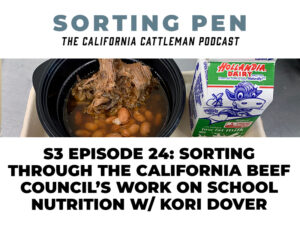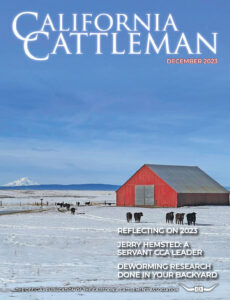
LEGISLATIVE BULLETIN
December 4, 2023
To read the full version each week, please subscribe below.
107th Annual Meeting Brings CCA Leadership Changes
Friday marked the end of the 107th Annual CCA/CCW Convention, held in Sparks, Nev. from Nov. 29 to Dec. 1. Over the few days, hundreds of attendees heard from speakers on a wide range of topics impacting the industry, spent time networking in the California Cattle Industry Tradeshow and met to review policy.
The event marked the end of a two-year term as CCA Second Vice President for Sheila Bowen (Kern County). CCA staff and leadership extend a special thank you to Bowen for the time, miles and energy put into being a CCA officer and for serving the Association for years.
John Austel (San Diego-Imperial) joins the officer team as CCA Second Vice President. Steve Arnold (San Luis Obispo County) still resides as CCA President, Rick Roberti (Plumas County) as CCA First Vice President, Mike McCluskey (Tehama County) as CCA Second Vice President and Frank Imhof (Contra Costa County) CCA Second Vice President. Bev Bigger (Ventura County) will continue as CCA Treasurer in 2024.
CCA would also like to recognize and thank the 2023 Top Hand Awards winners for all their efforts in recruiting new members into our Association.
1st Place: Jeff McKee (San Luis Obispo)
2nd Place: Tom Talbot (Inyo-Mono-Alpine)
3rd Place: Carolyn Roberti (Plumas-Sierra)
Lastly, thank you to all the members and supporters who participated in the event and helped make it a success. A recap on Convention and on policy changes from the event will be published in the December edition of CCA’s Hot Irons newsletter and the January edition of California Cattleman.
Speaker Rivas Announces New Committee Appointments
Late last month, Assembly Speaker Robert Rivas (D-Hollister) announced a slate of changes to the standing committees of the Assembly. According to a memo sent by Speaker Rivas to the Chief Clerk of the Assembly, the appointments “will be effective January 22, 2024,” providing incumbent committee leadership the opportunity to dispense with two-year bills (which must advance out of policy committees by Friday, January 19) before handing off their gavels.
New chairs for some of the Assembly committees most critical to CCA’s policy priorities are as follows:
- Appropriations: Assemblymember Buffy Wicks (D-Oakland)
- Budget: Assemblymember Jesse Gabriel (D-Encino)
- Budget Subcommittee No. 4 on Climate Crisis, Resources, Energy & Transportation: Assemblymember Steve Bennett (D-Ventura)
- Environmental Safety & Toxic Materials: Assemblymember Eduardo Garcia (D-Coachella)
- Natural Resources: Assemblymember Isaac Bryan (D-Los Angeles)
- Transportation: Assemblymember Lori Wilson (D-Fairfield)
- Water, Parks & Wildlife: Assemblymember Diane Papan (D-San Mateo)
CCA has strong relationships with many of these assemblymembers, and with the professional committee staff that will advise the new chairs. CCA staff looks forward to working with these leaders in the legislative year ahead to advance CCA’s policy priorities.
DWR Forecasts Initial State Water Project Allocations of Just 10%
The California Department of Water Resources (DWR) on Friday released its initial forecast of water supplies for 2024, projecting that State Water Project contractors will only receive 10% of requested supplies next year. The projection is based in part on the fact that California received exceedingly little precipitation in October and November of this year.
That said, DWR notes that forecasted allocations could improve in the months ahead, especially if the forecasted El Niño conditions result in a wet winter (it is worth noting that between February and April of 2023, projected allocations rose from 35% to 100% in light of an extraordinarily wet winter).
DWR will make final allocation determinations in April. The Bureau of Reclamation, which oversees the Central Valley Project, will make its initial allocation projections in February.
FSA Waives Notice of Loss Requirements for Two Livestock Disaster Assistance Programs
The USDA Farm Service Agency announced on Wednesday that it has waived deadlines to file notices of loss for 2023 under the Emergency Assistance for Livestock, Honeybees, and Farm-raised Fish (ELAP) program and the Livestock Indemnity Program (LIP).
For ELAP, producers have until January 30, 2024 to file a claim for livestock lost as a result of an eligible condition, such as “disease, water shortages and wildfires.” ELAP can also provide coverage for “grazing and feed losses, transportation of water and feed to livestock and hauling livestock to grazing acres.” Ordinarily, producers must file a notice of loss under ELAP within 30 days after becoming aware of the loss; the waiver functionally extends the deadline to file a notice of loss under ELAP to the annual program application deadline, which is January 30 of the subsequent year.
The deadline to file a notice of loss under LIP has been extended until February 29, 2024 for losses occurring in 2023. LIP compensates ranchers for livestock deaths above normal caused by “adverse weather, disease and attacks by animals reintroduced into the wild by the federal government or protected by federal law, including wolves.” As with ELAP, ranchers are usually required to file a notice of loss within 30 days of the loss becoming apparent.
In addition to extending the deadlines to file notices of loss for 2023, FSA has announced that its county committees will reevaluate all LIP and ELAP applications which have thus far been denied on the grounds of late filing this year. For more information, see FSA’s announcement, here.
New Episode of Stories From California Cattle Country
A new episode of Stories from California Cattle Country “Discussing feedlots in Imperial Valley with Mike Sulpizio of Superior Cattle Feeders” is out now! Stories from California Cattle Country is produced by the California Cattlemen’s Foundation with support from the California Cattle Council. To listen to the episode click here.
2023 Vesicular Stomatitis Virus (VSV)
From the California Department of Food and Agriculture Animal Health Branch
The VSV incident and situation in California remains active and ongoing, and continues to require vigilance throughout the state. Ongoing and active outreach to encourage prompt reporting of suspect lesions in horses and susceptible livestock and an immediate movement of any suspect animals will continue to assist with preventing virus spread by infected animals. To download the most recent information sheet, click here. To learn more, see the August 14 edition of Legislative Bulletin.
Upcoming Industry Events
CalVTP in Practice: New Implementation Tools and Lessons Learned Webinar
Dec. 7, 2023, Webinar
On Thursday, Dec. 7, happening from 10am – 12:05pm, a webinar focusing on insights about trends, tips and practices for agencies, fire safe councils, and landowners seeking to use the California Vegitation Treatment Program (CalVTP) to implemnt vegitation treatments will take place. To learn more and register, click here.
2024 NCBA Annual Convention
Jan. 31, 2024 – Feb. 2, 2024, Orlando, FL
Registration for the 2024 CattleCon is now open. Here attendees will have the opportunity to network, learn and advocate for the beef industry. To learn more, click here. To register, click here.
CCA in the News
CA local ballot initiative could decimate ag statewide Western Livestock Journal “California Cattlemen’s Association (CCA) is strongly opposed to the ordinance and called the measure ‘par for the course’ for anti-agriculture groups. ‘Having failed to pull the wool over lawmakers’ eyes, these radical groups are now trying to mislead the voters of Sonoma County to achieve their ends,’ Kirk Wilbur, CCA vice president of government affairs, told WLJ in an email.” To continue reading, click here.
Industry News
USFWS Reopens Comment Period on Proposal to List and Designate Critical Habitat for Two Salamander Species in Sierra Nevada Kern Valley Sun “The U.S. Fish and Wildlife Service announced the reopening of its October 2022 public comment period on the proposal to list and designate critical habitat for two slender salamanders living in California’s southern Sierra Nevada.” To continue reading, click here.
CDFA, Secretary Ross join announcement of methane reduction efforts with subnational governments at COP28 CDFA Planting Seeds Blog “With leadership from our dairy families, California agriculture has been working to reduce methane emissions for a number of years. In addition, our efforts will require global solutions, bold ideas, and international partnerships to achieve the maximum reductions needed to accomplish our shared climate change goals,’ said Karen Ross, California Secretary for the Department of Food and Agriculture.” To continue reading, click here.
A new episode of Sorting Pen: The California Cattleman Podcast is out now. In this week’s episode, registerd dietician and the California Beef Council’s Director, Food & Nutrition Outreach Kori Dover joins Katie to discuss the impact the CBC is making on school nutrition in California and how they are keeping beef on school lunch menus. To listen to the episode click here.



